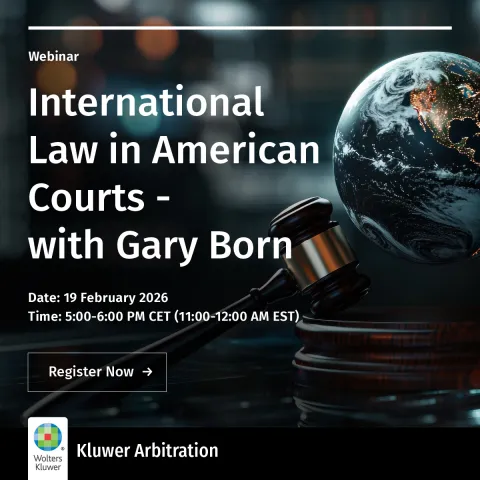Arbitrator's Nightmare: When Procedural Orders Backfire – Flex-n-Gate v. GEA
November 20, 2012
It must be an arbitrator's nightmare: Imagine a high-stake arbitration that goes on for years, the entire distance, including witness hearings and expert evidence, only for the final award to be set aside on procedural grounds. And this is exactly what the Frankfurt Court of Appeals (Oberlandesgericht Frankfurt) did in a judgment in February 2011: The post-M&A dispute between GEA and Flex-n-Gate began in October 2004. There were, for some time, parallel court proceedings in various jurisdictions. An interim award was made in 2006. The final award, rendered in 2010, was for EUR 210,658,362. In October 2012, the Frankfurt judgment which reversed it has been upheld by the Federal Supreme Court (Bundesgerichtshof). What had happened?
In 2004, German technology group GEA sold one of its subsidiaries to U.S.-based Flex-n-Gate. The SPA, governed by German law, provided for DIS arbitration. The transaction was never consummated. The dispute that followed from that led to arbitral proceedings being commenced. The arbitral tribunal split the proceedings into a liability phase and into a quantum phase. During the liability phase, several hearings took place and witnesses were heard. On that basis, in September 2006, a partial award was issued. It found respondent liable, and dismissed respondent’s counter-claim.
In October 2006, the arbitral tribunal turned to the quantum phase. It sent a draft procedural order to the parties, inviting the parties to comment on the draft and suggest changes. Taking into account the parties’ comments, the final version of the procedural order defined how the quantum phase was to be conducted. In particular, under the order, the parties were to disclose the documents that they had made available to their own experts. In the preamble, the order said that it recorded the agreement between the parties regarding the conduct of the quantum phase. Separately, the terms of reference had stated that the expert appointed by the tribunal was to carry out his own calculations, and should not rely on the calculations performed by claimant’s expert.
During the quantum phase, the claimant did not disclose all of the documents set out in the procedural order, nor did the expert appointed by the panel carry out his own calculations. Nevertheless, a final award in favour of the claimant was made in March 2010. Respondent then applied to the Frankfurt Court of Appeals to set the arbitral award aside. This application was based on various arguments, of which one ultimately was successful:
Respondent argued that the procedural order, as a result of having been agreed between the parties, constituted an agreement between the parties within the meaning in Sec. 1059 German Code of Civil Procedure (ZPO). Sec. 1059 ZPO provides that an arbitration award may be reversed, inter alia, if “the arbitration proceedings did not correspond to (…) an admissible agreement between the parties.” In respondent’s opinion, the arbitral tribunal was bound by the agreements between the parties as recorded in the procedural order. The tribunal had no discretion to unilaterally deviate from the procedural order during the quantum phase. As the procedural order had not been fully complied with, the arbitral proceedings did not correspond to the agreement between the parties and hence, the award had to be set aside.
The Frankfurt Court of Appeals (Oberlandesgericht) was persuaded by that argument and did set the award aside on that basis. The Frankfurt court looked through the formal nature of the procedural order and held, on the basis of the evidence before it, that in substance the order was an agreement between the parties. The Court gave particular weight to the fact that the wording had been negotiated in detail. In reaching this conclusion, it did take, inter alia, evidence on the content of a telephone conference between the parties’ lawyers and the tribunal. The Court applied the same analysis to the terms of reference. Claimant’s application for legal review (Rechtsbeschwerde) to the Federal Supreme Court (Bundesgerichtshof) was dismissed as inadmissible on procedural grounds, without stating any reasons (file no. III ZB8/11). The judgment of the Frankfurt Court of Appeals thus has become final.
The Frankfurt judgment was widely discussed in the German arbitration community, for instance at the DIS Autumn Meeting in October 2012, when the topic was on the agenda. I believe there is a wide-spread consensus that the approach taken by the Flex-n-Gate arbitral tribunal was very much in line with current international practice and the Frankfurt court decision came quite as a surprise. It was criticized for over-emphasizing the concept of party autonomy, as unreasonably interfering with the arbitration process and as sending the wrong signals to arbitrators by discouraging co-operative approaches to the conduct of arbitration. But Flex-n-Gate clearly poses a challenge to that practice for any arbitration with its seat in Germany. What some commentators have labelled “hybrid procedures” have, all of a sudden, become risky and may back-fire. Going forward, arbitral tribunals will need to be very clear in their communication, and distinguish whether they are in a co-operative modus operandi, or whether they are issuing procedural orders in their arbitral capacity. In the first instance, arbitrators will need the parties’ consent if they want to revise the game plan and deviate from the order, whereas in the second alternative, arbitrators will retain the liberty to amend existing procedural orders in their sole discretion.
You may also like











William McLaughlin
I am amazed at the final paragraph "I believe there is a wide-spread consensus that the approach taken by the Flex-n-Gate arbitral tribunal was very much in line with current international practice and the Frankfurt court decision came quite as a surprise." The process is a matter of party consensus and - OF COURSE - party autonomy is paramount and any legal agreement between the parties must be honoured or the tribunal should withdraw.